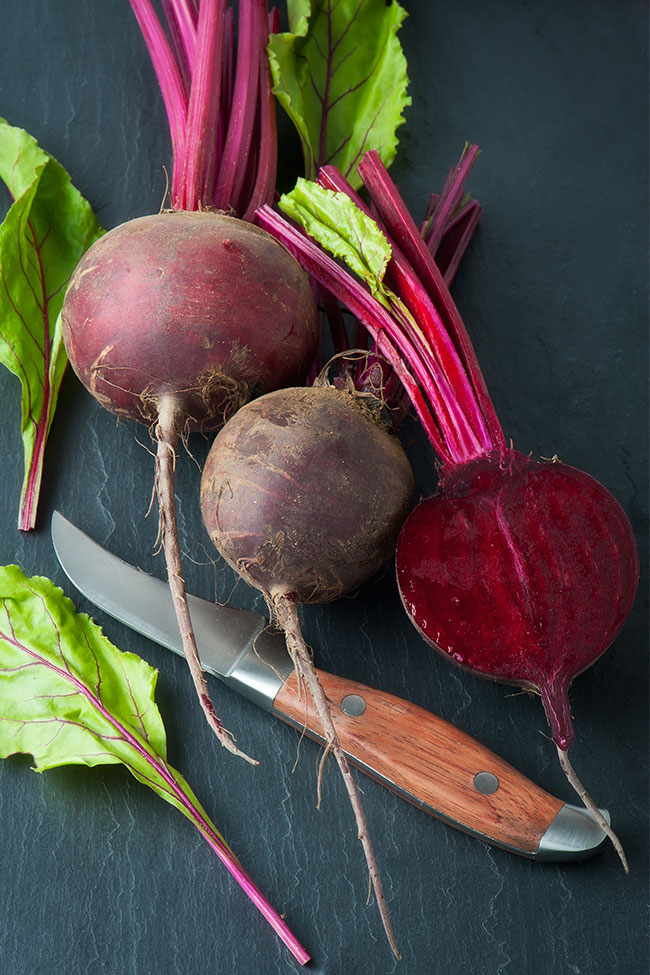
The number of smoothie recipes you can find is seemingly endless, and we’re not complaining. A cool, creamy drink is the perfect way to get a ton of nutrition in one meal or snack — as long as you watch the sweeteners and don’t add too much nut butter (hello, potential calorie bombs).
Yet, time after time, most of us tend to make the same smoothie. But if you’re willing to bust out of that rut, you’ll discover new flavors and textures while slurping up different nutrients at the same time. Everything from cauliflower and beets to jalapeños and carrot tops goes. If you don’t believe us, try the ingredients and recipes from two smoothie pros below. One sip may convert you to a wider range of smoothie possibilities.
READ MORE > THE TRUTH ABOUT SMOOTHIES
1. BEETS
Beets add vitamin C and potassium. Peel and use them raw in a berry smoothie, which masks the earthiness of the beets and brings out their sweet side. If red beets are too earthy for your taste, try golden beets. “Pairing beets with lemon and ginger can help cut the earthiness and bring out the sweetness,” says Jenna Tanenbaum, founder of Green Blender and creator of more than 700 smoothie recipes. If you don’t have a high-speed blender, steam, boil or roast beets before blending.
READ MORE > GET MORE BEETS ON YOUR TABLE
2. ARUGULA
Like other leafy greens, arugula is low in calories and high in vitamins A and K. Don’t let its famously bright flavor stop you from popping it in a smoothie. “Try it in a banana-chai smoothie to make the most of its spicy, black pepper notes,” suggests Jessica Young, chef and head of product at Daily Harvest.
4. CARROT GREENS
Carrot greens are filled with chlorophyll, which has been shown to be anti-inflammatory, and the younger ones taste like baby arugula or lettuce, so don’t throw them out. Not only can you toss the tops into soup, you can also add them to smoothies. That light flavor makes them perfect in place of spinach in any green smoothie recipe, according to Young.
5. CAULIFLOWER
Its neutral taste and white color may make cauliflower seem nutrient-void, but a cup has 69%of your daily vitamin C. It also adds a creamy texture to smoothies, so it’s a great way to add a sense of rich texture without banana or dairy. Young likes to add it to chocolate smoothies.
6. CAYENNE & CHILES
It may sound really out of place, but if you like spicy foods and drinks, cayenne, jalapeño or other chiles can totally go in a smoothie. Plus, capsaicin, the compound that makes jalapeños hot, has been shown to promote fat burning. These spicy additions are best with fresh herbs and citrus that help cut the spicy flavors, according to Tanenbaum. Remove the seeds to further tame the heat.
7. TAHINI
We add all kinds of nut and seed butters to smoothies — peanut, almond, cashew, sunflower — so why does this key hummus ingredient seem so out of place? “Tahini’s roasted, nutty flavor pairs well with sweet fig and earthy kale,” Young says. As a bonus, the spread also provides a good dose of calcium and iron.
8. TOMATOES
Tomatoes are a good source of vitamins A, C and E, as well as lycopene, an antioxidant that fights free radicals and cancer. “Summer is the best time to use tomatoes in your smoothies, because that’s when they will be most flavorful,” Tanenbaum says. “You can either make them the center of a attention in your smoothie recipe or have them fade into the background.” She recommends combining them with sweet flavors and adding a pinch of salt to enhance that sweetness.
9. ZUCCHINI & YELLOW SQUASH
These summer veggies are rich in lutein, a carotenoid shown to fight cataracts and age-related macular degeneration. “Because they have a soft skin, edible seeds and virtually no taste, they can be added to any smoothie,” says Tanenbaum. Plus they both provide a creamy, non-dairy base.
var mobile_slides = [];
jQuery( function($) {
function owlinitialize(){
$carousel = $(‘#owl-sliderid-23937’);
$(‘#owl-sliderid-23937’).on(‘initialized.owl.carousel changed.owl.carousel refreshed.owl.carousel’, function(e) {
if (!e.namespace) return
var carousel = e.relatedTarget
$(‘#sliderid-23937-info’).text(carousel.relative(carousel.current()) + 1 + ‘ OF ‘ + carousel.items().length);
if ( !$(‘#sliderID-23937-Nav’).length ) {
$(‘#sliderid-23937 .slide-nav’).append(‘
}
$(‘#sliderid-23937 .owl-carousel .item .slide-number .total-count’).each( function() {
$(this).text(carousel.items().length);
});
}).owlCarousel({
items:1,
loop:false,
autoHeight: true,
URLhashListener:true,
autoplayHoverPause:true,
dots: false,
nav:true,
mouseDrag: false,
navText: [
““,
“”
],
navContainer: ‘#sliderID-23937-Nav’,
startPosition: ‘URLHash’
});
}
$(“#sliderid-23937 .gallery-view”).click(function () {
$(“#sliderid-23937”).toggleClass(“carousel-gallery-view”);
});
$(‘#sliderid-23937 .back-to-slides’).click( function() {
$(“#sliderid-23937”).removeClass(“carousel-gallery-view”);
owlinitialize();
});
$(‘#sliderid-23937 .begin-slideshow’).click( function() {
$(this).hide();
$(‘#sliderid-23937 .slidenum’).show();
$(“#sliderid-23937”).addClass(“hide-overlay”);
});
$(window).on(‘hashchange’, function() {
$(‘#sliderid-23937 .begin-slideshow’).hide();
$(‘#sliderid-23937 .slidenum’).show();
$(“#sliderid-23937”).addClass(“hide-overlay”);
});
if( window.location.hash ) {
$(“#sliderid-23937”).addClass(“hide-overlay”);
$(‘#sliderid-23937 .begin-slideshow’).fadeOut();
$(‘#sliderid-23937 .slidenum’).fadeIn();
} else {
$(“#sliderid-23937 .begin-slideshow-overlay”).one(‘click’, function(e) {
$(‘#sliderid-23937 .begin-slideshow’).hide();
$(‘#sliderid-23937 .slidenum’).show();
$(“#sliderid-23937”).addClass(“hide-overlay”);
});
$(‘#sliderid-23937 .slidenum’).fadeOut();
$(‘#sliderid-23937 .begin-slideshow’).fadeIn();
}
function trigger_mobile() {
var win_width = $(window).width();
if ( win_width < 992 ) {
$(‘#owl-sliderid-23937’).trigger(‘destroy.owl.carousel’);
$(‘#sliderID-23937-Nav’).remove();
$(“#sliderid-23937”).addClass(“carousel-gallery-view”);
$(“#sliderid-23937”).addClass(“hide-overlay”);
$(window).scroll( function() {
$(‘#owl-sliderid-23937 .item’).each( function() {
if ( $(this).offset().top window.pageYOffset + 70 ) {
window.location.hash = $(this).attr(‘data-hash’);
}
});
current_slide = window.location.hash.substring(1);
if(current_slide) {
if($.inArray(current_slide, mobile_slides) == -1) {
ga(‘send’, ‘event’, ‘Post Sliders’, ‘Scroll’, ‘Mobile – ‘ + current_slide);
mobile_slides.push(current_slide);
}
}
});
} else {
$(“#sliderid-23937”).removeClass(“carousel-gallery-view”);
owlinitialize();
}
}
$(window).on(“load”, function(e) {
owlinitialize();
$(‘#sliderid-23937 .begin-slideshow’).click(function() {
ga(‘send’, ‘event’, ‘Post Sliders’, ‘Play’, ‘Play – slide-23937-1’);
});
$(‘#sliderID-23937-Nav .owl-next’).click(function() {
ga(‘send’, ‘event’, ‘Post Sliders’, ‘Next’, ‘Next – ‘ + window.location.hash.substr(1));
});
$(‘#sliderID-23937-Nav .owl-prev’).click(function() {
ga(‘send’, ‘event’, ‘Post Sliders’, ‘Prev’, ‘Prev – ‘ + window.location.hash.substr(1));
});
});
$(window).on(“load resize”, function(e) {
trigger_mobile();
});
});
The post 9 Creative Ways to Boost Your Smoothie Game appeared first on Under Armour.
(via MyFitnessPal Blog)















